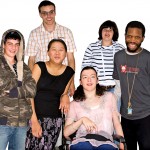
Sarah Carr explores a recent cross-sectional study on sexual minority status and symptoms of psychosis, which looks at the role of bullying, discrimination, social support and drug use.
[read the full story...]
Sarah Carr explores a recent cross-sectional study on sexual minority status and symptoms of psychosis, which looks at the role of bullying, discrimination, social support and drug use.
[read the full story...]
At the start of LGBT History Month, Sarah Carr presents some recent research into sexual orientation and symptoms of common mental disorder or low wellbeing.
[read the full story...]
Hannah Morgan examines a study on social care for disabled men living with long term conditions and discovers the importance of agency, choice and control.
[read the full story...]
Jo Moriatry examines a qualitative study about the experience of social work students who are black and minority ethnic; lesbian, gay or bisexual; or disabled and find that social work education has still some way to go in being inclusive.
[read the full story...]
People with learning disabilities need to be able to talk about sexuality, sex and relationships, but often this opportunity is denied or is heavily influenced by existing social and cultural norms.
In this, her debut blog, Michelle Gregory looks at a paper which reports on how one self advocacy group tackled this issue and how they disseminated their findings.
[read the full story...]
Knowledge about sexuality is a key factor in helping people develop healthy relationships, maintain their sexual health and avoid potentially abusive situations, but how much do sexuality education programmes for people with learning disabilities help fulfil these aims?
In her debut blog, Sian Anderson looks at a review of literature which looks at the effectiveness of sex education programmes and educational materials developed for people with mild or moderate learning disabilities.
[read the full story...]
Sexuality is a core aspect of human experience, but for many people with learning disabilities, there continues to be considerable confusion about sexuality and significant gaps in their knowledge Opportunities for people to participate in relationships and education about sexuality can be affected by attitudes and perceptions of family carers, support workers and professional staff. [read the full story…]

Supporting adults with learning disabilities to express their sexuality and form intimate relationships is an area that continues to challenge provider organisations. One of the factors that impacts on this is public attitudes. This study reports on the findings of the attitudes of the general public in Ireland. The researchers looked at the data from [read the full story…]

A short while ago, we posted about the development of a tool to help understand the sexual knowledge of people with learning disabilities which was piloted in a secure services setting. There is a growing literature which focuses on issues of abuse, contraception or sex education, but there is little which has looked at how [read the full story…]

Research in the field of mental health has suggested associations between risky sexual behaviour and common psychiatric conditions, with higher than prevalence rates of HIV than found in the national average, risk of sexual coercion and high rates of relationship breakdown. The authors of this paper suggest that there are encouraging signs of positive attitudes [read the full story…]